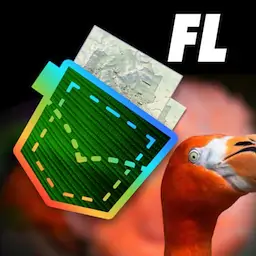"Sunset over the preserve, Big Cypress National Preserve, 2015." by U.S. National Park Service , public domain
Florida PantherBig Cypress |
featured in
| National Parks Pocket Maps |  | |
| Florida Pocket Maps |  |
Big Cypress
Florida Panther
National Park Service
U.S. Department of the Interior
Big Cypress
National Preserve
NPS/RALPH ARWOOD
The Florida panther (Felis concolor coryi) is the state animal of Florida, being voted as such by the school children of the state
in 1987. The panther was chosen over other animals such as the alligator, manatee, white-tailed deer, and the black bear as the
best representative of Florida fauna. The panther is without a doubt the most formidable predator in Florida. Habitat loss has
made the panther one of the most endangered animals in North America.
T
he Florida panther has embodied the natural landscape
of Florida for many thousands of years. An elusive
creature that is seldom seen by human eyes, the panther
stalks the sawgrass prairies and pinelands of the Big Cypress
Swamp. Silently ambushing its prey, the panther is a master
of the swamp, helping to efficiently keep the wild game
populations healthy.
Home in the Swamp
It is no secret to cat owners that felines dislike water yet
here in Big Cypress, water, the most abundant resource, is
a pivotal aspect of the panther’s life. Where most other cats
would starve based on their fear of water, the panther has
adapted to life around our watery world. Inhabiting higher
and drier pinelands and hardwood hammocks, the panther
regularly interacts with all aspects of the swamp. It will make
dens in the dense saw palmetto, lie in wait in the sawgrass
prairies, forge through the wet cypress strands, and spend
lazy days in the shade of the hardwood hammocks.
Food Sources
While there is an abundance of aquatic life within the Big
Cypress Swamp, the panther prefers a more terrestrial
meal. The white-tailed deer of South Florida make up
the main diet of the panther, but it will also hunt for wild
hog, raccoons, rabbits, armadillos, and birds. While it may
feed on these smaller animals, the larger the prey that it
feeds on, the healthier the panther will be. For example a
panther would need to feed on ten raccoons to equal the
nourishment from one deer. In order to maintain proper
health the panther must kill one deer per week on average.
The panther will lie in wait, or patiently stalk, waiting for
the right moment to pounce out of its hiding spot and seize
its prey. Using retractable razor sharp claws to hold its prey,
it will usually bite the back of the neck, and in one quick
movement break the neck. These tawny brown colored
animals are most active at dawn and dusk, factors that
enhance camouflage among the sawgrass prairies in the dim
light.
Fun Panther Facts
• The panther is a sub-species of the cougar and is also
known as the puma, mountain lion, catamount, or
painter.
• The panther once roamed from Texas to Florida to the
northern part of Tennessee.
• Panthers can live to be 10 years of age or older.
• Panthers do not normally spend much time in trees,
although many pictures depict them this way. They are
merely trying to escape the scientists who are tracking
them.
• The panther is the only sub-species of the cougar which
can be found east of the Mississippi River.
Mating and Reproduction
A female panther will reach the age of sexual maturity by
the time she is two and a half years of age, while the male
is usually three years. The females will signal they are ready
for copulation by scent, or by caterwauling, a yowl that is
so loud and shrill that many people mistake the scream
for that of a human woman. This has earned the panther
the name of the swamp screamer. The female will remain
pregnant for around three months and have a litter of one to
three kittens. The kittens are born with many spots on their
coats, which are used as camouflage while bedding in their
den of saw palmetto. The mother needs to regularly leave
the den to hunt for the extra food needed for her young, so
the kittens must be safe and hiding maintains this security.
By the time the kittens are two months old they will begin
traveling out with the mother to learn how to hunt. While
they are born with the instinct to chase prey, the proper
methods of hunting must be learned.
Decline of a Population
During the later part of the 1800s, many hunters sought out
the panther due to the belief panthers were taking many
farmers’ livestock. Florida has always been a major producer
of the country’s cattle, therefore the panthers were hunted
in record numbers in order to protect these livestock. To
encourage the elimination of the panther, a $5 bounty was
placed on all panthers, which led to a widespread loss of
panthers across the state. This occurence coupled with
a major habitat loss brought the panthers to the brink of
extinction. At one point the estimated number of panthers
in the wild was down to around 30. This was also a major
problem because it caused record numbers of the panthers
to inbreed. The inbreeding caused many genetic deficiencies
such as cowlicks, bent tails, and sterility. Their entire future
was in serious jeopardy.
Panther Deaths and Causes
1970-2009
Miscellaneous causes include predation, septicemia, dermatophytosis,
euthanasia, feline leukemia, shoooting, pregnancy, old age, ruptured
aorta, pneumonia, intraspecies aggression, and neck injury.
1970-74
1975-79
References
US Fish & Wildlife Service www.fws.gov/species/species_accounts/bio_alli.
html
Florida Fish & Wildlife Commission www.myfwc.com/gators/
US Fish & Wildlife Service http://www.fws.gov
39
Miscellaneous
2 1
Did you know?
There is no such animal as a black panther. The black cats
commonly referred to as such are black due to a melanistic
gene found in jaguars and leopards of Latin America and
Southeast Asia. A melanistic cat has an abundance of
coloring pigment in it’s fur that causes it to appear all black.
It is the opposite of albinism, where there is a complete lack
of coloring pigments.
36
Vehicle
1
The National Park Service works in conjunction with other
agencies to study the panther in order to better protect these
natural areas. A current plan includes fitting many panthers
with radio tracking collars to better understand their dayto-day movement. The panthers are initially tracked down
by members of the National Park Service and tranquilized,
fitted with a radio collar, given shots of antibiotics, blood
samples are taken, and measurements are made. This
data helps to secure more effective ways of preserving the
panther. The better the information collected, the better
chance that the panthers may survive.
NPS/RALPH ARWOOD
Data: Florida Fish & Wildlife Conservation Commission
What is Being Done?
The passing of the Endangered Species Act of 1973, allowed
the panthers their first step towards revitalization. The
panther was among the first animals in the United States
to be placed on the list. They were immediately afforded
federal protection, but this did not mean their numbers
started to grow immediately. Initially a few female cougars
were introduced from Texas to add genetic diversity to the
remaining population of panthers in Florida. The Texas
cougars were returned after two years, but the introduction
allowed the Florida panthers to start to revitalize their
population. There are currently between 80-100 cats left
in the wild. Nearly a third of this population’s territory
ranges within Big Cypress National Preserve. The biggest
problem for the panthers to date is habitat loss and highway
collisions. More than any other reason, collisions with
cars are the main contributor to the panthers’ population
decline today. In 2007, 17 panthers were hit and killed by
cars in South Florida. In an effort to limit the interaction of
the panthers and cars, fencing has been installed along I-75
and SR-29. This fencing leads to underpasses that allow the
wildlife to cross the highways without risk of being hit by
passing motorists.
14
6
5
4
6
1
1980-84
1985-89
1990-94
62
39
11
1995-99
2000-04
2005-09
EXPERIENCE YOUR AMERICA
A panther kitten warns an intruder to the den.
Florida Panther_FINAL.indd on HQ shareall, interp publications: 4,000 printed 10/2010, stored at Oasis & WC


